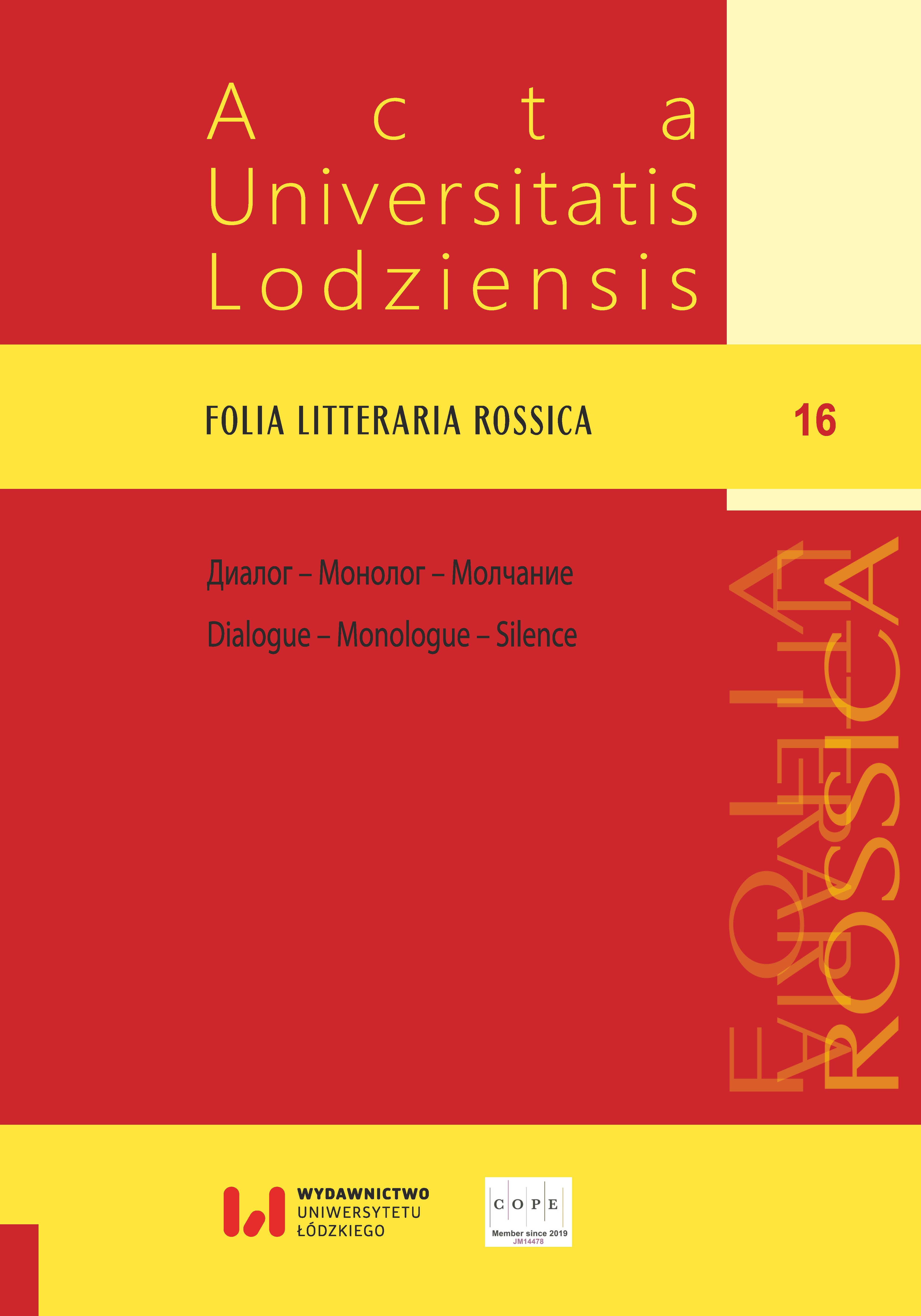Dialogue with Cultural Tradition: Contextualizing Fear in Lyudmila Ulitskaya’s Novel The Big Green Tent
DOI:
https://doi.org/10.18778/1427-9681.16.14Keywords:
Á. Heller, L. Ulitskaya, The Big Green Tent, fear as an initiation, hero-„rabbit”Abstract
Lyudmila Ulitskaya’s works are characterized by the large number of references to the most diverse cultural phenomena of the depicted era. Her novel The Big Green Tent is dedicated to the generation ofthe dissidents of the 1960s, including their role in the cultural life of the era of the “thaw” and the “stagnation”. L. Ulitskaya evaluates the activity of this generation precisely because they “were the first generation in Russia to overcome the fear of power”. Therefore, one of the most important components of the plot is the problem of “initiation by fear” and the possibility of overcoming it. This article considers the contextualisation of fear, the cultural and literary background, on the basis of which the fear of the heroes is comprehended. Based on the Hungarian philosopher Ágnes Heller’s concept of emotion, fear is perceived to be acomprehensive concept, combining three different types of feelings – affective, cognitive-situational and, thirdly, when the feeling becomes apersonality trait. Corresponding to these types, the contextualization of fear in the novel takes place on three levels. First, in specific situations ofthe depicted world, where the hero’s fear manifests itself as an “animal” feeling and the emphasis is placed on overcoming it. Second, fear is the subject of the hero’s reflections and meditations, in which its literary context is created. Third, on the author’s level, thanks to various intertextual links, the very image of the hero acquires symbolic significance. Thus the contextualization of fear activates awide range ofcultural traditions, with which Ulitskaya’s novel enters into afruitful dialogue.
Downloads
References
Afinogenov, Aleksandr. Strakh. Letchworth–Herts–England: Prideaux Press, 1976.
Google Scholar
Averintsev, Sergei. Strakh kak initsiatsiya: odna poeticheskaya konstanta poezii Mandelshtama. In: Averinstev i Mandelshtam. Stati i materialy. Moskva: RGGU, 2011: 147–155.
Google Scholar
Denisenko, Valeriya. “Aleksandr Solzhenitsyn i Fazil Iskander: Ob odnom neuchtonnom istochnike filosofskoi skazki ‘Kroliki i udavy’”. Politicheskaya lingvistika. No. 4 (50) (2014): 231–236.
Google Scholar
Erlikh, Sergei. “Dekabristy. Istoriya mifa”. Peterburgskii istoricheskii zhurnal. No. 2 (2019): 160–168.
Google Scholar
DOI: https://doi.org/10.51255/2311-603X-2019-00033
Gosteva, Anastasiya. Lichinki, deti lichinok. Intervyu s Ludmiloi Ulitskoi (21.12.2010). [Dostępne online: https://test.gazeta.ru/culture/2010/12/21/a_3472805.shtml]
Google Scholar
DOI: https://doi.org/10.1016/j.comche.2010.05.001
Heller, Ágnes. Az érzelmek elmélete. Budapest: Jószöveg műhely, 2009.
Google Scholar
Heller, Mikhail. Mashina i vintiki. Istoriya formirovaniya sovetskogo cheloveka. London: Overseas Publications Interchange Ltd., 1985.
Google Scholar
Iskander, Fazil. Kroliki i udavy. [Dostępne online: https://sd-inform.org/upload/books/Literatura/Iskander/Kroliki%20i%20udavy.pdf]
Google Scholar
Lotman, Jurii M. O semiotike “styd” i “strakh” v mekhanizme kultury. In: Semosfera. Sankt-Peterburg: Iskusstvo-SPb, 2000.
Google Scholar
Lotman, Mikhail Yu. Mandelshtam i Pasternak (popytka kontrastivnoi poetiki). Tallin: Aleksandria, 1996.
Google Scholar
Osmukhina, Olga. “‘Doktor Zhivago’ B. Pasternaka i ‘Zelenyi shator’ L. Ulitskoi: Pereosmyslenie traditsii liricheskoi epopei”. Filologiya i kultura. No. 3 (33) (2013): 206–209.
Google Scholar
Peinturier-Magnat, Maria. “Pamyat russkoi kultury v romane ‘Zelonyi shator’ Lyudmily Evgenyevny Ulitskoi”. Paris: Humanities and Social Sciences, 2016. [Dostępne online: https://dumas.ccsd.cnrs.fr/dumas-01380174/document]
Google Scholar
Serman, Ilya. Afinogenov i ego “Strakh”. In: Semiotika strakha, eds. N. Buhks, F. Conte. Paris–Moskva: Sorbonne, Russkii Institut, 2005: 261–272.
Google Scholar
Solzhenitsyn, Aleksandr. Arkhipelag GULaG. 1918–1956. Opyt khudozhestvennogo issledovaniya. Vol. 1. Part 1–2. Moskva: Tsentr “Novyi mir”, 1990.
Google Scholar
Szabó, Tünde. Statii po poetike L. Ulitskoi. Moskva: Flinta, 2022.
Google Scholar
Ulitskaya, Lyudmila. “Za chtenie mogli posadit v tyurmu”. Lyudmila Ulitskaya o detstve, yunosti i samizdate (16.09.2018). [Dostępne online: https://lenta.ru/articles/2018/09/16/authors/?ysclid=li1g9xx814707760768]
Google Scholar
Ulitskaya, Lyudmila. Zelenyi shator. Moskva: AST, 2015.
Google Scholar
Downloads
Published
How to Cite
Issue
Section
License

This work is licensed under a Creative Commons Attribution-NonCommercial-NoDerivatives 4.0 International License.












